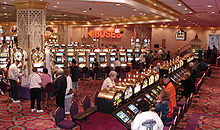This article needs additional citations for verification. (June 2019) |
| This article is part of a series on the |
| Economy of the United States |
|---|
 |

In the United States, gambling is subject to a variety of legal restrictions. In 2008, gambling activities generated gross revenues (the difference between the total amounts wagered minus the funds or "winnings" returned to the players) of $92.27 billion in the United States.[1]
The American Gaming Association, an industry trade group, states that gaming in the U.S. is a $240 billion industry, employing 1.7 million people in 40 states.[2] In 2016, gaming taxes contributed $8.85 billion in state and local tax revenues.[3]
Critics of gambling argue it leads to increased political corruption, compulsive gambling, and higher crime rates. Others argue that gambling is a type of regressive tax on the individuals in local economies where gambling venues are located.
- ^ "Industry Information: Fact Sheets: Statistics: Gaming revenues for 2007". American Gaming Association. Archived from the original on 2007-09-28. Retrieved 2007-05-19.
- ^ "About AGA".
- ^ "2016 STATE OF THE STATES" (PDF).
© MMXXIII Rich X Search. We shall prevail. All rights reserved. Rich X Search
